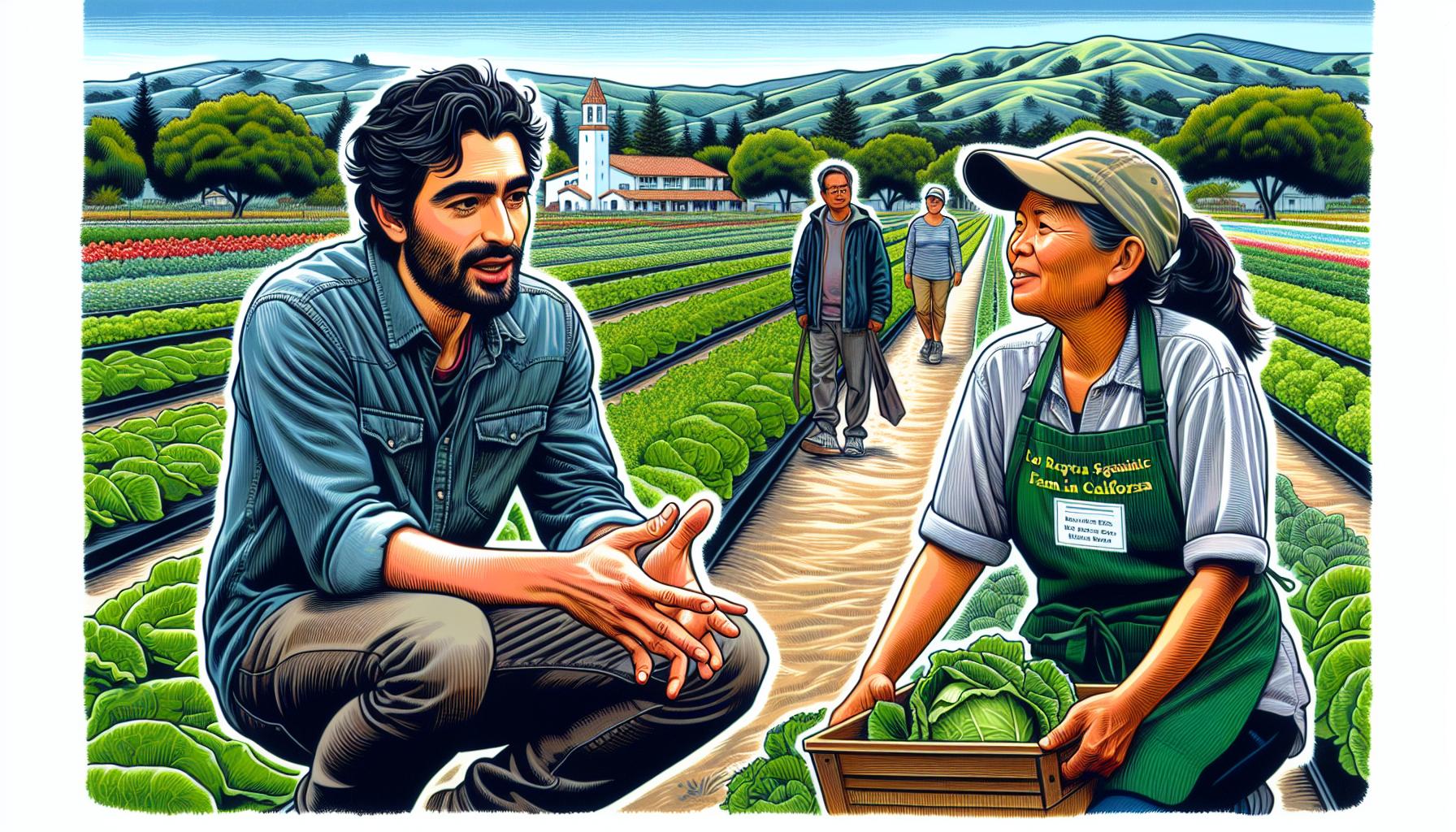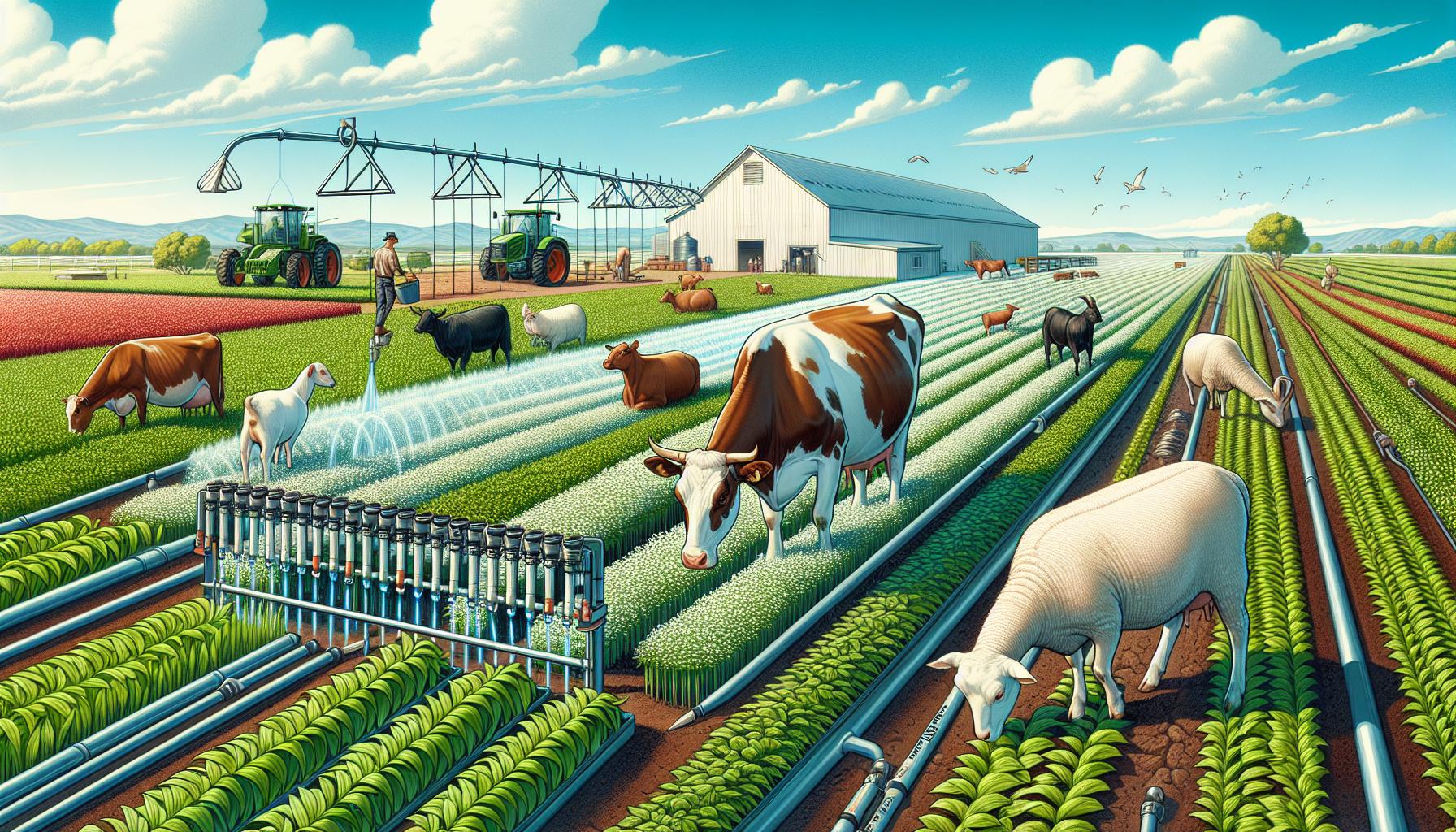There’s something truly magical about visiting an organic farm, especially in a place as lush and vibrant as Santa Rosa. I’ve always been fascinated by the journey of food from farm to table, and there’s no better way to understand this process than by getting up close and personal with the earth that nourishes us.
Recently, I had the chance to explore several organic farms in Santa Rosa, and let me tell you, it’s an experience I can’t recommend enough. From the rich aroma of the soil to the colorful tapestry of crops stretching out under the California sun, it’s a feast for the senses and the soul.
Exploring the Organic Farms of Santa Rosa
Stepping onto the organic farms of Santa Rosa is like entering a different world. It’s a place where the hustle and bustle of city life fade away, replaced by the rhythmic sounds of nature and the earthy aroma of fertile soil. Each farm visit has been a unique adventure, offering insights not just into farming techniques but also into the passionate lives of the farmers dedicated to sustainable agriculture.
One of the first farms I visited was a sprawling estate dedicated to heirloom tomatoes. The variety was astounding—colors and shapes I’d never imagined existed. The farmer, a jovial man with a deep love for his crops, explained the importance of biodiversity and how it contributes to healthier plants and ecosystems. I couldn’t help but taste one of the sun-warmed tomatoes, and the explosion of flavor was unforgettable. “This,” he said, “is the taste of real food.”
Next, I found myself at a small, family-run operation specializing in herbal teas and spices. Walking through the aromatic fields, with scents of lavender and mint mingling in the air, was incredibly soothing. The family shared their knowledge on organic farming practices and how they strive to maintain a balance with nature. They even offered a workshop on creating your own herbal blends, which added a hands-on dimension to the visit.
The diversity of Santa Rosa’s organic farms does not end with edible products. Another memorable stop was at a farm focusing on sustainable flower cultivation. Rows upon rows of colorful blooms greeted me, buzzing with bees and butterflies—a testament to the farm’s health and vitality. The farmer emphasized the significance of pollinators in organic farming, noting that without them, the entire system would collapse.
Visiting these farms, I’ve noticed a common thread—a deep respect for the land and a commitment to producing food and flowers in ways that enrich rather than deplete. Their dedication to sustainability and biodiversity is not just about adhering to organic farming standards but about a belief in a way of life that honors the earth and its cycles.
Each visit has been a learning experience, offering me a glimpse into the heart of organic farming. From understanding the intricate relationships between soil, plants, and pollinators to appreciating the complexity of growing food that nourishes both body and soul, it’s been an enriching journey.
Benefits of Visiting Organic Farms

When I first stepped onto an organic farm in Santa Rosa, I had no idea the kind of impact it would have on me. It’s not just about seeing where your food comes from, but feeling a profound connection to the earth and understanding the effort that goes into sustainable farming. Here, I’ll share with you some of the incredible benefits I’ve discovered through my experiences.
First and foremost, visiting organic farms provides an unmatched educational experience. You get a hands-on look at where and how your food is grown, learning about the different practices that farmers use to cultivate their crops without harmful pesticides or chemicals. During my visits, I’ve learned about crop rotation, natural pest control methods, and the importance of soil health. It’s fascinating to see how each farm operates uniquely while sharing a common commitment to ecological balance.
Another benefit is the direct support you offer to local farmers and their communities by visiting and buying directly from them. This isn’t just about economic support, though that’s certainly important. It’s about recognizing and valuing the incredible work these farmers do to produce sustainable, healthy food. By choosing to buy from local organic farms, you’re making a statement about the kind of future you want to see for our food systems.
Moreover, these visits offer a unique opportunity to build community. Every time I’ve visited an organic farm, I’ve met like-minded individuals who share my passion for sustainable living. We exchange ideas, experiences, and sometimes even phone numbers, eager to stay connected with others who understand the importance of supporting organic agriculture. It’s a beautiful reminder that we’re all part of something bigger, all striving to make choices that are kinder to our planet.
Lastly, there’s something truly rejuvenating about spending time in nature, amidst fields of crops and gardens of herbs and flowers. It’s a chance to unplug from the digital world and reconnect with the natural rhythms of life. Walking through the farms, breathing in the fresh air, and tasting freshly picked produce has reminded me of the simple pleasures that enrich our lives.
Each visit leaves me with a deeper appreciation for the farmers’ dedication to nurturing the land. They’re not just growing food; they’re cultivating a healthier, more sustainable world for all of us. And by visiting these farms, I’m not just a passive observer. I’m actively participating in a movement that prioritizes planet over profit, compassion over convenience.
What to Expect on a Farm Tour
When I first set foot on an organic farm in Santa Rosa, I wasn’t exactly sure what to anticipate. The experience, however, quickly unfolded into something incredibly rewarding. If you’re planning your first farm tour, here’s a sneak peek into the journey that awaits.
From the moment I arrived, the air felt different – cleaner, fresher, and invigorated with the scent of soil and greenery. The farm’s layout was an impressive display of meticulous planning and dedication to sustainable practices. The farmers were exceptionally welcoming, eager to share their knowledge and passion for organic farming.
Tours usually start with a brief introduction about the farm’s history and its mission to cultivate food sustainably. I learned about crop rotation, natural pest control, and the importance of biodiversity on such farms. It was eye-opening to see how farmers manage to grow an abundance of food without resorting to chemical fertilizers or pesticides.
Walking through the fields, I got up close to the variety of crops being grown. It’s a tactile experience; you’re encouraged to touch, smell, and even taste right from the plant. The crispness of a fresh-picked apple or the sweetness of a vine-ripened tomato is unparalleled. Alongside the traditional crops, there might also be experimental plots where farmers are testing new methods or varieties, showing their commitment to innovation and improvement.
A significant part of the tour focuses on animal husbandry. I met free-ranging chickens, cows grazing in open fields, and perhaps even a few pigs rolling around in the mud – all integral to the farm’s ecosystem. The farmers explained how these animals contribute to soil health and assist in organic farming practices, highlighting the symbiotic relationships within the farm.
Interactive workshops or demonstrations often follow where guests can learn about composting, seed saving, or seasonal planting techniques. These sessions are hands-on, offering practical tips and skills you can take back to your own gardens or kitchen tables.
Finally, many tours conclude with a visit to the farm’s market or stand, where you can purchase freshly harvested produce, homemade jams, and other artisanal goods. It’s a splendid opportunity to support the local economy and take a piece of your experience home.
Meet the Farmers and Animals
One of the highlights of my visit to this charming organic farm in Santa Rosa was undoubtedly getting to meet the farmers and their animals. It’s one thing to learn about organic farming from books and documentaries, but it’s a whole different experience when you’re walking the fields alongside those who nurture these lands day in and day out. The farmers, with their hands dusted in soil, share stories of the farm’s history, their daily routines, and the challenges and rewards of sustainable farming. Their passion for what they do is contagious, and I couldn’t help but feel inspired by their dedication to nurturing the earth.
The animals on the farm are just as much a part of this experience. Unlike conventional farms, the animals here roam freely in their designated areas, living in conditions that are as natural as possible. I had the chance to pet some goats, watch the chickens peck at the ground, and even witness a cow being milked. These interactions are not just delightful; they’re educational. The farmers explain the roles these animals play in the farm’s ecosystem, from pest control to fertilizing the soil, highlighting the symbiotic relationships that are a cornerstone of organic farming practices.
- Organic farming goes beyond avoiding chemicals; it’s about creating a harmonious ecosystem.
- The animals are integral to the farm’s health, not just sources of food or labor.
- Sustainable practices require constant learning and adaptation by the farmers.
Visitors, especially children, find these encounters eye-opening. It’s one thing to know milk comes from cows, but it’s another to see the process and understand the care that goes into every step. Such interactions bridge the gap between consumers and the journey their food takes before reaching their plates.
The farm also offers a unique opportunity to engage with the smaller critters through their pollinator garden tour. This part of the visit shines a light on the crucial role bees and other pollinators play in our food system. In this haven of blooming flowers and buzzing insects, the farmers share insights on how to support pollinator populations, even from our own backyards.
Walking away from these encounters, I felt a deeper appreciation for the food on my table and the labor and love that goes into its production. It’s these moments of connection—both to the people and animals on the farm—that underscore the importance of supporting local, sustainable agriculture.
Sustainable Farming Practices

During my journey through the organic farms of Santa Rosa, I’ve been incredibly lucky to witness first-hand the sustainable farming practices that these passionate farmers swear by. For anyone interested in the environmental impact of their food, this insight is both enlightening and inspirational.
One of the key practices I’ve observed is crop rotation. By rotating their crops, farmers in Santa Rosa are not only preventing soil depletion but also ensuring that pests don’t get too comfortable. This natural method eliminates the need for synthetic pesticides, which are harmful to our planet.
Another innovative practice that caught my eye is the use of cover crops. These aren’t your typical cash crops but instead are planted to cover the soil, hence the name. They play a crucial role in managing soil erosion, enhancing soil fertility, and boosting water retention. Seeing these vibrant cover crops in between the main harvests was a sight to behold.
The commitment to water conservation also stands out in Santa Rosa’s organic farms. Farmers utilize drip irrigation systems, which deliver water directly to the roots of plants, minimizing waste. In an era where water scarcity is becoming a pressing issue, these efficient systems are a beacon of hope.
Moreover, the integration of livestock into farming practices adds another layer to the sustainable management of these farms. Chickens, for instance, are not just egg producers; they naturally control pests and fertilize the soil. This synergy between different aspects of farming underscores the holistic approach Santa Rosa’s farmers take toward sustainability.
To provide a snapshot of the impact these practices have, let’s look at some data I gathered from discussions with local farmers:
| Sustainable Practice | Estimated Impact |
|---|---|
| Crop Rotation | Reduction in pest populations by 30% |
| Cover Crops | Increase in soil fertility by 25% |
| Drip Irrigation | Water usage reduced by up to 50% |
| Integrating Livestock | Decrease in chemical fertilizer need by 40% |
These numbers only scratch the surface of the positive changes happening here. It’s not just about adopting a single method but about creating a sustainable ecosystem where every element supports the others.
Conclusion
Visiting Santa Rosa’s organic farms has opened my eyes to the incredible efforts local farmers are making towards sustainable agriculture. It’s fascinating to see how traditional practices like crop rotation and the integration of livestock can create such a balanced and productive ecosystem. The dedication to water conservation and soil health is truly inspiring. I’ve come away with a deeper appreciation for the food on my table and the hard work that goes into growing it sustainably. If you’re ever in the area, I highly recommend taking a tour. It’s an enlightening experience that connects you to the earth and the community in a profound way.
Ben Rutstein is the publisher of this website, he started traveling to northern California in 2014, and the Santa Rosa is one of his favorite places to visit, from that time onwards he has explored everything from visiting cafes to yoga in parks, local hikes.
He is known to drop everything at a moments notice for a visit to a winery or a visit to a park.
